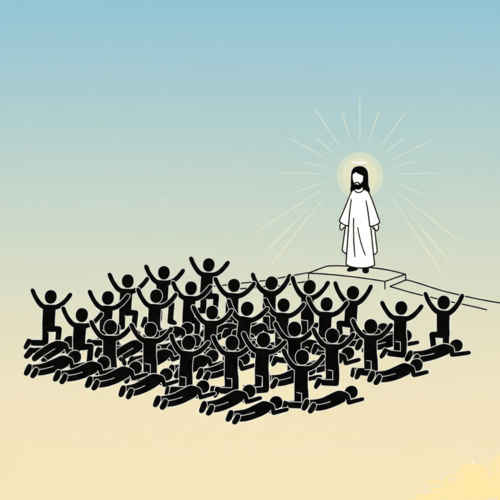Interracial Marriages: Does God Frown On Them?
The question hits close to home for many Christian couples and families today. As our churches become increasingly diverse, believers are falling in love across ethnic lines—and wondering if God approves. Some have been told Scripture forbids interracial marriage, leaving them torn between their faith and their hearts.
The short answer? No, God does not frown on interracial marriage. In fact, Scripture consistently affirms the unity of all peoples in Christ and contains no prohibition against marriage between different ethnicities. Let’s examine what the Bible actually teaches.
THE BIBLICAL FOUNDATION: WE ARE ONE RACE
From the very beginning, Scripture presents humanity as unified. Genesis 1:27 declares God created mankind—all of mankind—in His own image. This divine image isn’t distributed differently based on skin color or ethnicity; it’s the shared inheritance of every human being.
The Apostle Paul makes this even clearer in Acts 17:26, stating God “made from one blood every nation of men to dwell on all the face of the earth.” Notice Paul doesn’t say God made different races with different blood—he says one blood, one human family. Biologically and theologically, we’re talking about one human race with beautiful ethnic diversity, not separate races.
CLEARING UP COMMON MISCONCEPTIONS
The “Curse of Ham” Myth Perhaps no passage has been more tragically misused than the story of Noah’s curse in Genesis 9. For centuries, some have twisted this text to suggest God cursed certain ethnic groups. This interpretation is both historically inaccurate and biblically unfounded.
The curse was pronounced on Canaan (Ham’s son) and concerned specific ancient nations—not entire ethnic groups. Reformed scholars have consistently rejected racial interpretations of this passage. The story has nothing to do with skin color or interracial marriage.
Old Testament Marriage Prohibitions “But didn’t God forbid the Israelites from marrying foreigners?” This question deserves a careful answer.
When God prohibited certain marriages in the Old Testament (like in Deuteronomy 7:3-4), the issue was always religious, never racial. God’s concern was that foreign spouses would “turn your heart away after their gods.” The prohibition was about preventing idolatry, not maintaining ethnic purity.
This becomes clear when we see godly interethnic marriages celebrated in Scripture. Rahab the Canaanite became part of Jesus’ family line. Ruth the Moabite is held up as a model of faithfulness. These women weren’t condemned for their ethnicity—they were praised for their faith.
“Unequally Yoked”—This Is About Faith, Not Race When Paul warns believers not to be “unequally yoked” with unbelievers (2 Corinthians 6:14), he’s addressing spiritual compatibility, not ethnic differences. The issue is faith versus unbelief, not whether spouses share the same cultural background.
GOD’S HEART FOR DIVERSITY
Scripture doesn’t just permit interracial marriage—it actually celebrates ethnic diversity within God’s people.
- Consider Moses, who married a Cushite woman (likely from modern-day Ethiopia). When his siblings Miriam and Aaron criticised the marriage, God was so displeased that He struck Miriam with leprosy (Numbers 12:1-15). God literally defended Moses’ interracial marriage.
- Look at Jesus’ genealogy in Matthew 1. It includes multiple ethnicities—Tamar the Canaanite, Rahab the Canaanite, Ruth the Moabite, and Bathsheba (likely a Hittite). The Messiah’s own family line was beautifully multi-ethnic.
- The early church embraced this diversity. Philip baptized the Ethiopian eunuch. Peter brought the gospel to Cornelius the Roman centurion. Mixed congregations became the norm, not the exception.
WHAT REFORMED THEOLOGY TEACHES
Reformed theology offers helpful principles for thinking through this issue:
The Regulative Principle reminds us what Scripture doesn’t forbid, we shouldn’t forbid either. Since God’s Word contains no prohibition against interracial marriage, neither should we.
Christian Liberty teaches that in matters where Scripture gives freedom, Christians are free to follow their conscience. The Westminster Confession affirms God alone is Lord of the conscience in such matters.
The Unity of the Body is perhaps most important. Galatians 3:28 declares in Christ there is “neither Jew nor Greek”—ethnic distinctions don’t create barriers in the Christian community. If we’re unified as brothers and sisters in Christ, why shouldn’t we be able to marry across ethnic lines?
PRACTICAL WISDOM FOR TODAY
This doesn’t mean interracial couples don’t face challenges. Sadly, prejudice still exists, and couples may encounter difficulties that same-ethnicity couples typically don’t. Pastoral wisdom suggests:
- Be prepared for challenges while trusting God’s grace to sustain you
- Seek family unity through patient conversation and gospel-centred love
- Find a supportive church community that celebrates diversity
- Focus on spiritual compatibility as the primary foundation for marriage
The key is ensuring you’re both committed believers who share the same Lord, not the same skin tone.
THE GOSPEL VISION
Marriage is ultimately a picture of Christ and the church (Ephesians 5:32). How beautiful it is when the picture includes the ethnic diversity that will characterise heaven itself—“every tribe and tongue and people and nation” worshiping together (Revelation 5:9).
Rather than frowning on interracial marriage, God smiles on unions that reflect His heart for all peoples. When Christians from different ethnic backgrounds marry, they’re living out the gospel truth that Christ breaks down every dividing wall.
CONCLUSION: INTERRACIAL MARRIAGES
God doesn’t frown on interracial marriages—He celebrates them as expressions of His love for all peoples. The Bible’s consistent message is human unity, not ethnic separation. While practical challenges may exist, they’re cultural problems, not biblical ones.
The church should be the first place where ethnic diversity is celebrated, not the last. When we embrace biblical truth about race and marriage, we become living testimonies to the power of the gospel to unite what the world seeks to divide.
INTERRACIAL MARRIAGES: RELATED FAQs
What about the Tower of Babel? Didn’t God separate the nations on purpose? The Tower of Babel (Genesis 11) was God’s judgement on human pride and rebellion, not a command for permanent ethnic separation. God scattered the nations to humble their arrogance, but His ultimate plan has always been to regather all peoples through the gospel. The Great Commission explicitly calls us to reach “all nations” (Matthew 28:19), and Pentecost reversed Babel’s confusion by enabling all ethnicities to hear the gospel in their own languages.
- How do we handle racist family members who oppose our interracial relationship? This is one of the most painful aspects many couples face. Approach resistant family members with patience, grace, and firm boundaries. Continue to love them while making it clear that racist attitudes are sinful and won’t be tolerated. Sometimes seeing your Christ-centred relationship over time may help change hearts, but you may need to limit contact if family members remain persistently hostile or abusive.
- What about preserving cultural heritage and traditions? Interracial marriages don’t require abandoning cultural heritage—they can actually enrich it by combining traditions from multiple backgrounds. Many couples successfully maintain meaningful connections to their respective cultures while building new family traditions together. Children from these unions often develop a beautiful appreciation for multiple cultures and can serve as bridges between communities.
- Are there any biblical examples of God commanding ethnic separation? The only biblical separations God commanded were religious, not racial. Israel was called to be separate from pagan nations because of their idolatry, not their ethnicity. Even then, foreigners who embraced the true God were welcomed into the covenant community (like Ruth and Rahab). The ceremonial laws that created some social boundaries were fulfilled in Christ and explicitly abolished for New Testament believers (Acts 10, Ephesians 2:14-16).
How do we raise children who are mixed-race in a way that honours both backgrounds? Mixed-race children are a beautiful picture of God’s diverse creation and the unity we have in Christ. Help them embrace their full heritage by teaching about both cultural backgrounds, maintaining relationships with extended family from both sides when possible, and most importantly, grounding their identity in Christ rather than ethnicity. Prepare them to answer questions about their background with confidence and grace.
INTERRACIAL MARRIAGES: OUR RELATED POSTS
- Does God Have A Specific Person in Mind to Be My Spouse?
- Unequally Yoked in Marriage: Recipe for Disaster?
- Divine GPS: How may I Discern God’s Will?
- Saving a Hasty Marriage: God’s Perspective
- The Debate Post 1: Complementarianism Vs Egalitarianism
- Biblical Gender Roles in Home and Church
- Biblical Gender Interpretations: Complementarian vs Egalitarian Views
Editor's Pick

‘Flee Sexual Sin’: Why Does Paul Single This Sin Out?
When the apostle Paul writes to the Corinthian church, he doesn’t tell them to simply avoid sexual immorality or resist [...]

Does Denying God’s Sovereignty Mean Denying the Gospel?
RC Sproul once warned denying God’s sovereignty “eviscerates” grace—a strong word meaning to gut or disembowel something, leaving only an [...]

Why Christians Fast: The Biblical Discipline’s Very Real Rewards
Why would Christians, who rejoice in the good gifts of food and fellowship, deliberately choose to go without? Isn’t fasting [...]

The Christian Sabbath: Why Did Sunday Replace Saturday?
Consider this: God-fearing Jews who’d faithfully observed Saturday Sabbath for over a thousand years suddenly began gathering for worship on [...]

Did the Early Christians Worship Jesus? The Biblical Evidence
It was a startling transformation: Jewish fishermen who'd spent three years following this itinerant carpenter from Nazareth now begin to [...]

If Jesus is Messiah, Why Aren’t ALL Messianic Prophecies Fulfilled?
If Jesus is truly the Messiah, why hasn't world peace arrived? Why do Jews still face persecution? Why isn't the [...]

When Courage Fails: Will I Be Forgiven If I Deny Christ in Persecution?
The rooster crowed, and Peter remembered. In that devastating moment, the apostle realised he’d just done the unthinkable—three times he’d [...]

What Makes a Godly Dad? 5 Biblical Principles Fathers Need
Modern culture sends fathers mixed messages. Be strong but sensitive. Be involved but not overbearing. Lead but don’t dominate. With [...]

What Makes a Godly Mom? A Scripture-Backed Guide
In our culture’s confusion about gender roles and parenting, the timeless question remains: what makes a godly mother? While secular [...]

Paul’s Mandate for Men: Headship Or Servant Leadership? Or Both?
Modern Christianity has fallen into a trap. We've created an either/or battle between "headship" and "servant leadership," as if these [...]
SUPPORT US:
Feel the Holy Spirit's gentle nudge to partner with us?
Donate Online:
Account Name: TRUTHS TO DIE FOR FOUNDATION
Account Number: 10243565459
Bank IFSC: IDFB0043391
Bank Name: IDFC FIRST BANK






